163 CD / TACETs Four Seasons
TACETs Four Seasons
Antonio Vivaldi
The Four Seasons
Concerto RV 317 in G minor
Concerto RV 257 in E flat major
Polish Chamber Philharmonic Orchestra
Daniel Gaede, violin
Tube Only / Transistorfrei
EAN/barcode: 4009850016304
„Best Of The Year Discs for 2008“ (Audiophile Audition)

Description
„Long live the tube! Auch die jüngste Veröffentlichung aus der „transistorfreien“ Serie von Tacet ist ein klangliches Juwel. Was Tonmeister Andreas Spreer mit seiner nostalgischen Spitzentechnik, bei der für die Aufnahme ausschließlich Röhren-Mikrofone und Röhren-Verstärker zum Einsatz kommen, hier wieder auf die Scheibe gezaubert hat, ist von einer Natürlichkeit, Wärme und Lebendigkeit des Klangs, wie wir sie längst verloren glaubten und schon fast vergessen hatten. Hier klingt eine Geige noch wie eine Geige.“ (klassik-heute)
5 reviews for 163 CD / TACETs Four Seasons
You must be logged in to post a review.

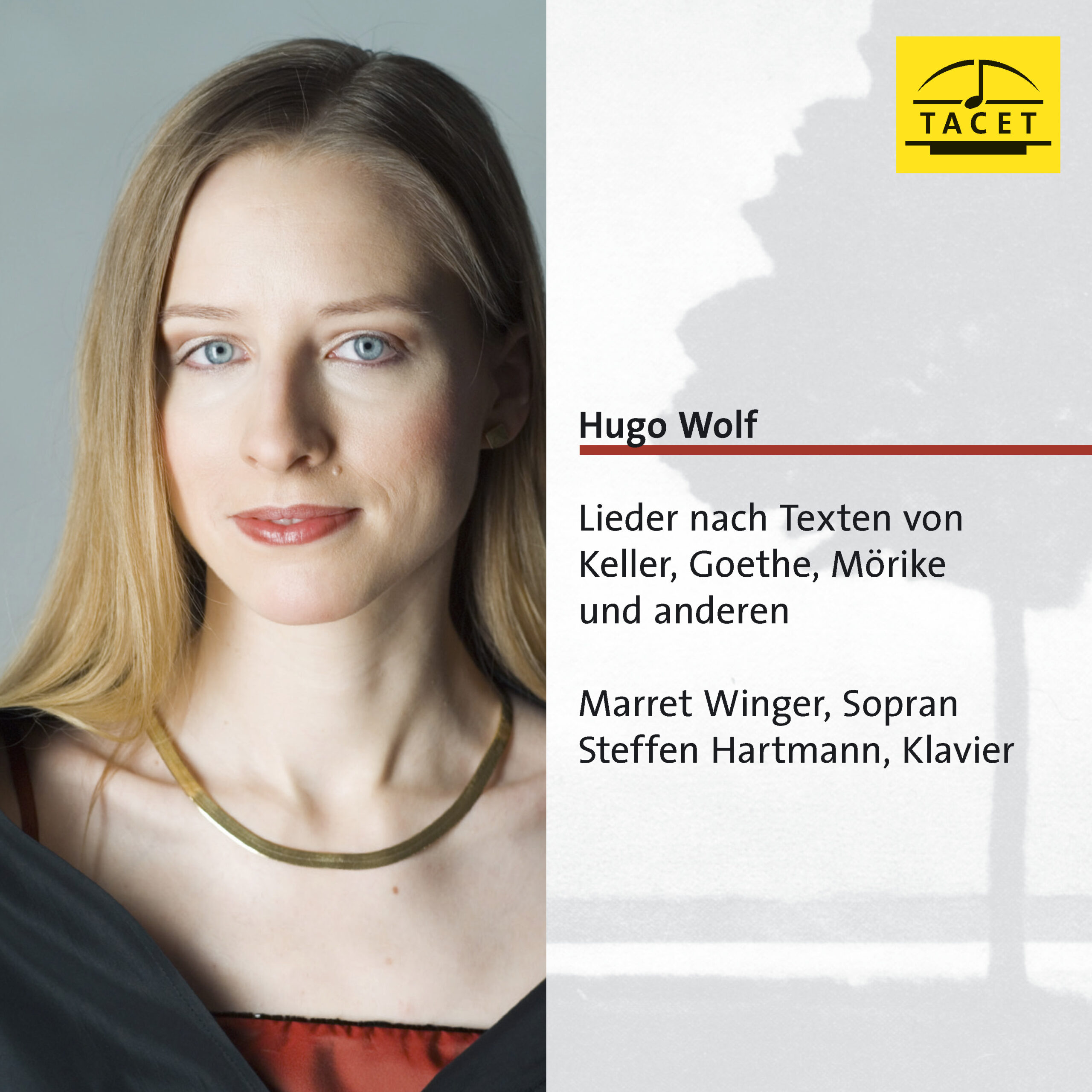
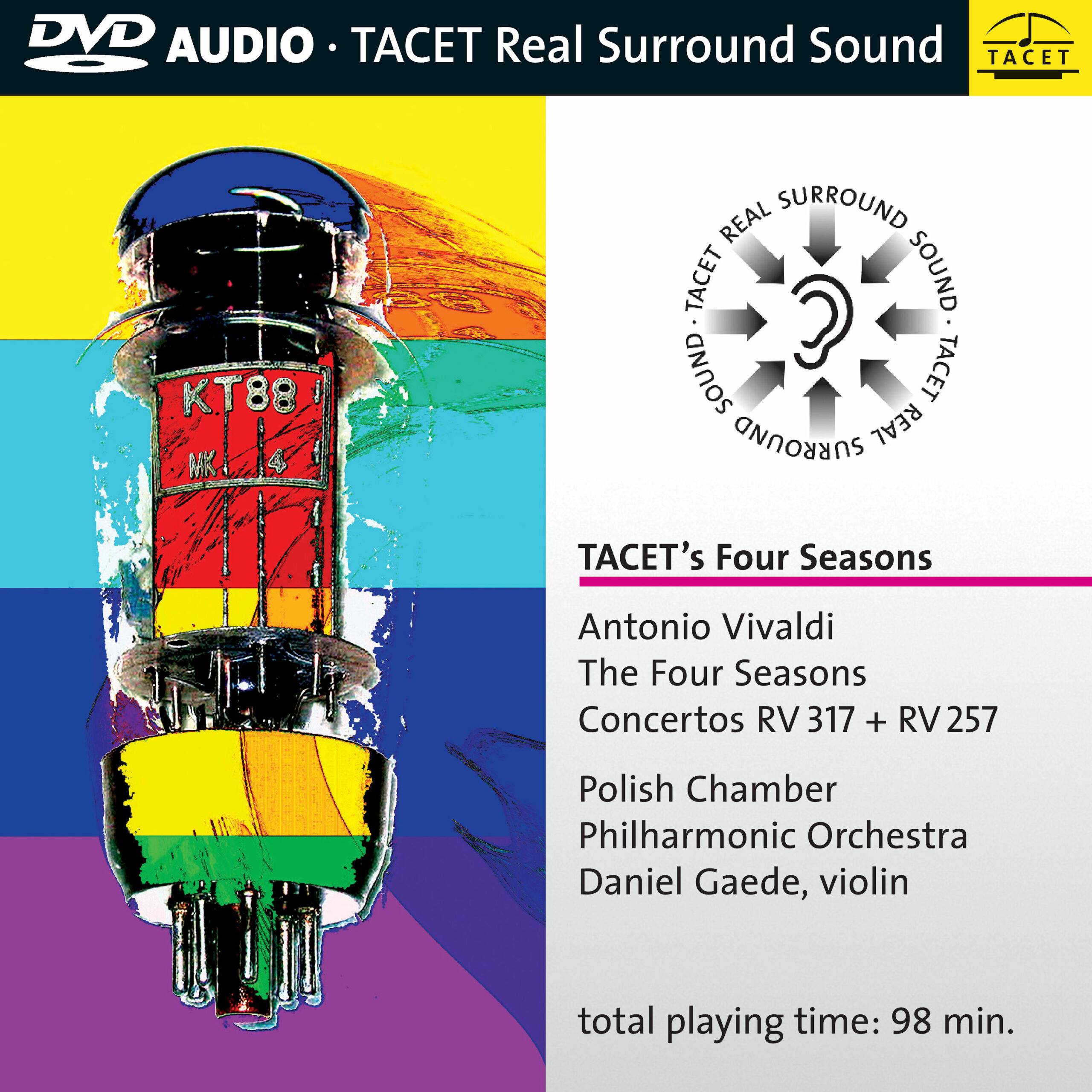
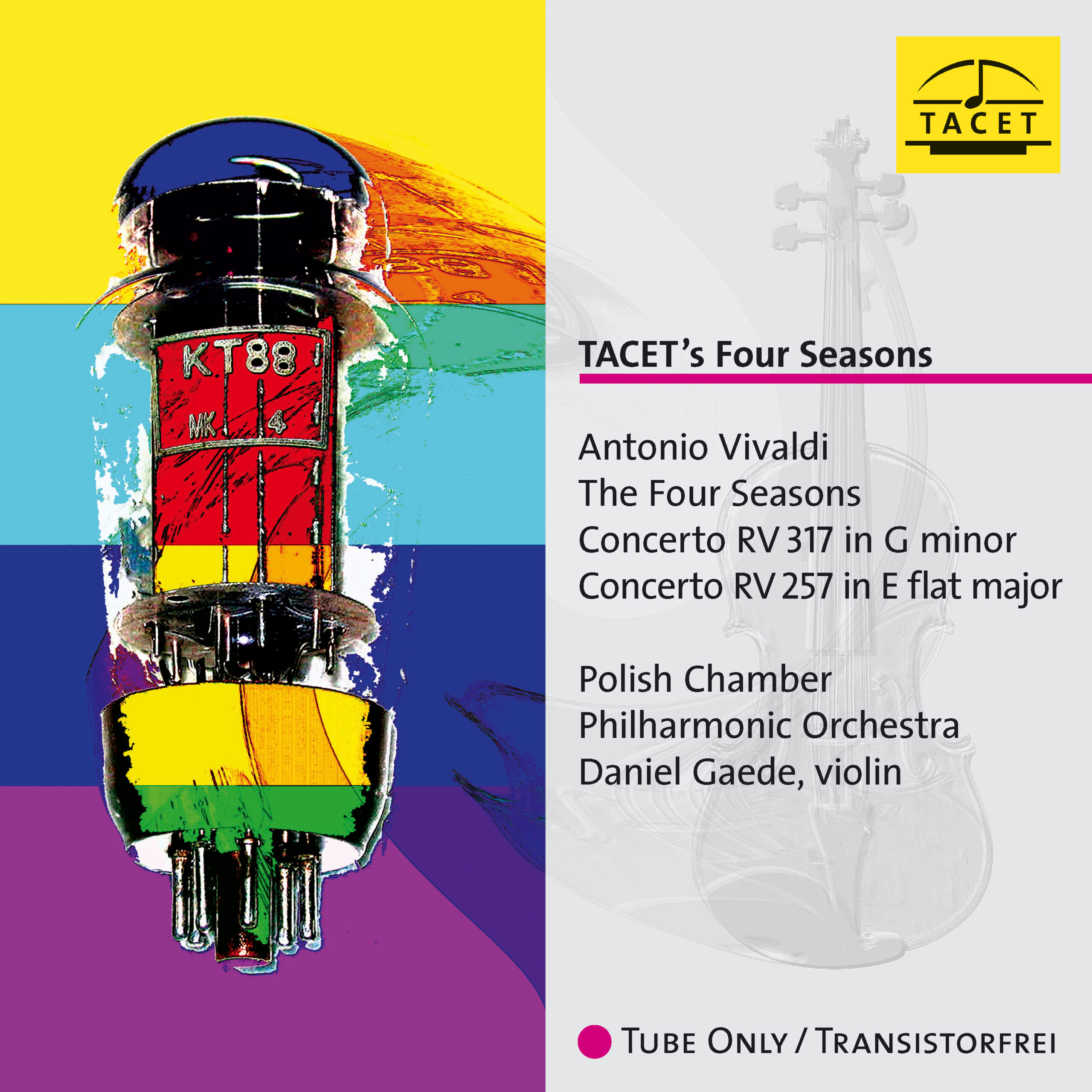
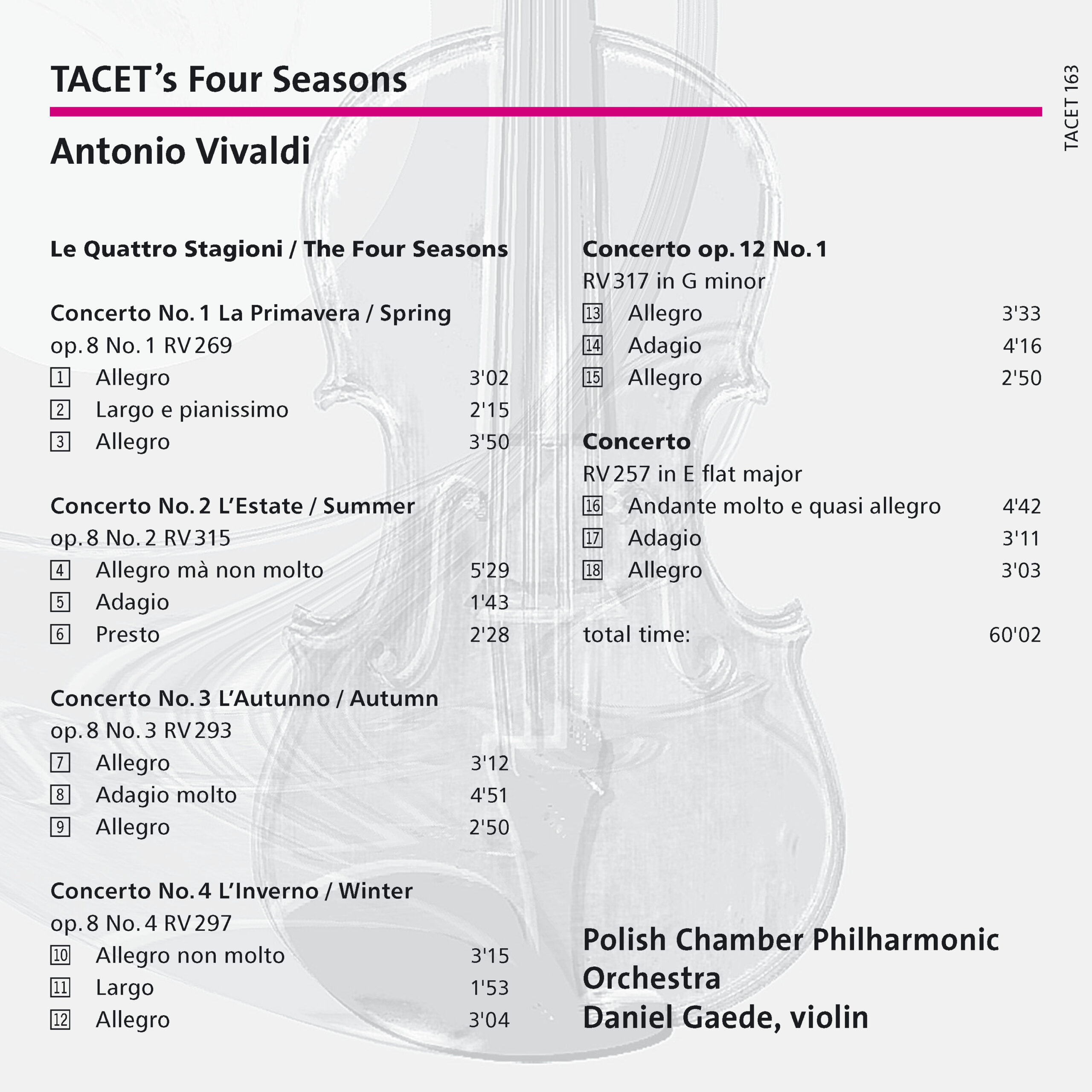
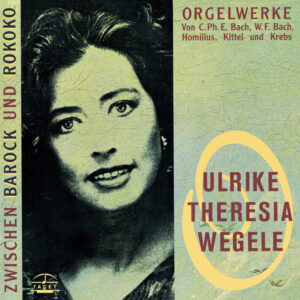
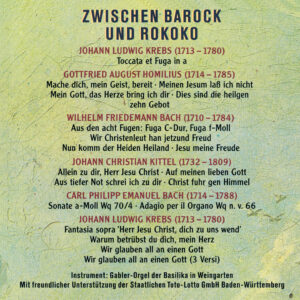
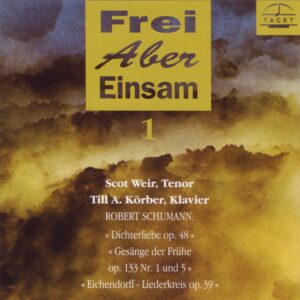
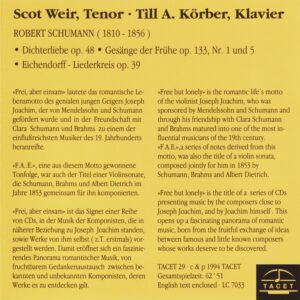
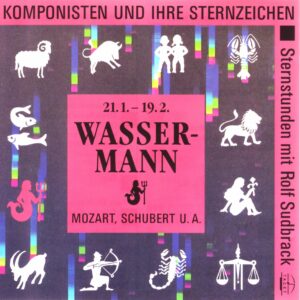
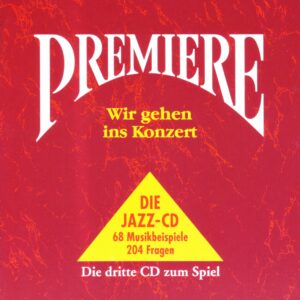
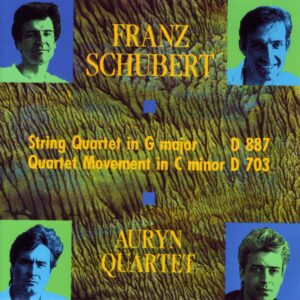
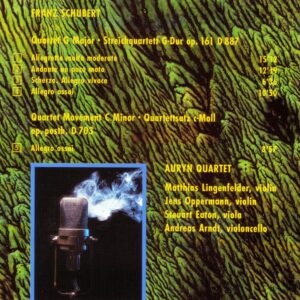
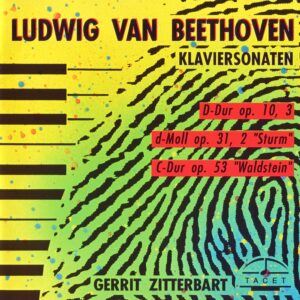
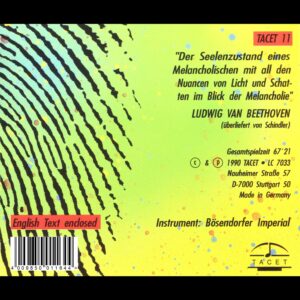
Klassik heute –
Long live the tube! This newest release in the “transistor-free” series by Tacet is another musical jewel. The music that Tonmeister Andreas Spreer with his nostalgic, exquisite recording technique, using nothing but tube microphones and tube amplifiers, has conjured onto the disc boasts a naturalness, warmth and vividness we thought had disappeared forever and had almost forgotten. Here a violin still sounds like a violin.
Musically, one can almost sense the enormous pressure that anyone tackling Vivaldi’s much-overused opus must feel today. Open, uninhibited playing is hardly possible under such circumstances. This may explain why, in this meticulously detailed recording, simple musical elements such as sequences, alternations, or suspensions and resolutions are not always rendered adequately, and some subtleties of phrasing escape the listener’s attention. Fortunately, Daniel Gaede and the excellent orchestra from Sopot resist the temptation to outshine the embellished versions of some colleagues under the pretext of modernization or historical stylization; instead, they adhere strictly to the text and remain within its given framework. The hurried first movement of Spring, in which the full stops before each solo episode hardly seem convincing, and the rather restrained Danza pastorale initially temper expectations, yet the listening pleasure steadily increases thereafter. Gaede plays responsively, with fine articulation, though his phrasing is not always entirely persuasive. The orchestra delivers thunder, lightning, and storms with full force, yet the virtuosity with which the Allegro sections are executed at near-record speed sometimes borders on smoothness and carries a slight mechanical feel. Praise is due to the unnamed, reliable continuo cellist and the harpsichord, which haunts the drunken villagers’ slumber restlessly (unfortunately, in the second movement of Autumn, the track marking on the CD is misplaced!).
The two admittedly lesser-known concertos, with the G minor violin concerto being particularly appealing, come across as more relaxed than The Four Seasons – almost as if the pressure had finally been lifted from all involved. Last but not least, attention should be drawn to the thought-provoking booklet essay by Christoph Ullrich, which rounds off this overall very gratifying production.
Sixtus König
Audiophile Audition –
This disc is noted for the all-tube equipment in the recording chain up to the point when the analog signals captured initially by the Neumann M49 tube microphones (the music) is converted to digital and normalized to the so-called Red Book CD Standards so as to be played as regular CDs. It should be noted that these classic Neumann M49 tube microphones were developed in 1949 and manufactured around 1951.
From the top, to my ears this orchestra just got rid of all romanticized vibrato and played with pure tone, and as a result the instruments sound much older than they really are. The music’s execution thus shows a small chamber orchestra becoming in touch with the past; it is a modern instrument orchestra that sounds like a period instrument ensemble. Changing to period bowing styles makes a world of difference and there is no question about it, the tempi are fast and there is nothing ponderous in these enlightened performances. On this disc nobody gets in the way of Vivaldi, nor interferes with him either, and all seem to be Vivaldi’s advocates!
The Four Seasons from the Opus 8 is a unique set of four violin concertos by Antonio Vivaldi (1678-1741) composed in 1723 and first published as scores for solo violin and string quartet in 1725. The present version is a modern transcription with different instrumentation for a small chamber orchestra including a harpsichord providing the basso continuo part. These four concertos were written by Vivaldi to go along with four sonnets and they are, therefore, true tonepoems, and an early example of programmatic music. Do yourself a favor and follow the music with the text of the sonnets and see how much more sense the whole thing makes. The text for the sonnets can be found at www.baroque-music-club.com/vivaldiseasons.htmlhttp://www.baroque-music-club.com/vivaldiseasons.html).
On listening to this Four Seasons there is a physical sensation that can, as in this recording, be transformed into an emotional sensation that comes through the sounds and the expert manipulation of stringed instruments’ acoustics; instrumental acoustics is not the same as hall acoustics. Instrumental acoustic balancing control is exemplary throughout but none more so than in Tracks No. 8 (Adagio molto), No. 14 (Adagio) and No. 17 (Adagio). Moreover, the strings are supremely strong and precise throughout while observing a warm pure tone as in Track No. 10’s an Allegro molto violin solo with cellos and contrabass accompaniment which in turn moves swiftly to the marvelous violin pizzicatos of Track No. 11’s Largo with their perfect syncopation, and the remaining strings providing pure tonal harmony.
The music in this disc is not about anyone, not even about Daniel Gaede - the violin soloist - the music is about Vivaldi with a very lean and taut sound. The present orchestra jells together very well their modern instruments and period sound with their lilting fast allegros, sharply-executed phrasing in the slow middle movements, and the joyous final prestos. There is energy and commitment from the orchestra’s parts, the soloist and the conductor as evidenced by their precise entrances and of all things no discernible mistakes. All this I am saying about the Four Seasons can be transposed to the other two violin concertos on this disc just as well.
The “tubes only” sound is adequate but nothing on the spectacular side; I am not convinced that “tubes only” regular CDs have much to contribute and I would rather see (or hear) a “tube only” SACD. On this CD imaging is excellent but dynamics are just rather flat, save for an occasional entrance of the cellos and/or the contrabass when playing very loud. My very subjective opinion is that an SACD recording would have been a much better choice. In this “tube only” incarnation the sound is less than…
Final words: fortunately the artistry of the performance amply surpasses the just average sound and that could be a good enough reason to justify this disc.
John Nemaric
Pizzicato –
Vivaldi’s Seasons is the most recorded piece in music history, and now there is still a premiere: TACET has recorded this work – written far from any climate-change polemics – entirely transistor-free. “Tube Only” is the process, which we have praised several times before, delivering astonishingly pure sound. And once again we say: even without surround, one feels as if sitting in front of the orchestra in Sopot, so natural and unadulterated is the sound image. Musically, the disc offers nothing but the finest: we hear a thoroughly lively, pulsating, and fascinating interpretation, with Daniel Gaede performing as soloist with supreme poise and beautiful tone.
RéF
Classics Today France –
Liebe Barockfreunde, verzeiht, wenn ich euch schockiere. Eine 10/10-Bewertung für polnische Vier Jahreszeiten mit einem Geiger, den nur wenige Eingeweihte kennen? Ja.
Es geht nicht darum zu behaupten, diese Aufnahme ersetze alle anderen. Aber man muss festhalten: Diese Einspielung schafft, was so viele verfehlt haben – die kammermusikalische und virtuose Version für „Otto Normalhörer“. Gaede gelingt, woran Perlman, Shaham, Mutter (in ihrer zweiten Aufnahme) und Sarah Chang gescheitert sind. Dort, wo Kennedy (zweite Version, in Berlin) einen guten Eindruck hinterließ und wo Gidon Kremer (zweite Version, bei Nonesuch) bislang als beste Wahl galt.
Wir bewegen uns hier nicht im Bereich der historischen Instrumente. Das Polnische Kammerphilharmonie-Orchester betritt das Terrain des Kölner Kammerorchesters von Helmut Müller-Brühl. Vielleicht klingt es weniger brillant als das Combattimento Consort Amsterdam oder die Deutsche Kammerphilharmonie – Ensembles, die ebenfalls moderne Instrumente mit „stilistischer Bewusstheit“ einsetzen. Hört man jedoch die außergewöhnliche Sommer-Version des Polnischen Kammerorchesters, ist dieser vermeintliche Qualitätsunterschied nicht erkennbar.
Das theatralische Element bei Biondi und Il Giardino ist unbestreitbar. Doch auch diese Interpretation ist ungemein ausdrucksstark – ganz ohne Übertreibung. Das unterscheidet sie etwa von Pavel Šporcls Einspielung (Supraphon), die das überbordende Ego eines „genialen Verrückten“ widerspiegelt. Hier wird alles auf maximale Eloquenz und Glut gebracht, ohne jede Manieriertheit oder Übersteigerung. Diese Deutung steht in der Tradition von Pinnock-Archiv – allerdings auf modernen Instrumenten.
Daniel Gaede, bereits durch andere Tacet-Aufnahmen aufgefallen, war von 1994 bis 2000 Erster Konzertmeister der Wiener Philharmoniker. Wie gesagt: Er schafft, woran die Stars gescheitert sind. Seine glühende Virtuosität steht ganz im Dienst der Musik – er gibt nicht den „großen Solisten“. Vielmehr scheint er sich wie ein Erzähler aus dem Orchester herauszulösen. Man höre nur seinen zweiten Satz des Herbst ganz ohne Vibrato – als Illustration der ersten frostigen Tage.
Apropos Frost: Der Beginn des Winters ist ebenso eisig wie bei Pinnock, wenn auch für meinen Geschmack etwas zu schnell (ebenso wie das Largo). Und was die „Klasse“ der Aufnahme betrifft: Man achte darauf, wie der letzte Ton des zweiten Satzes gesetzt und verklingt – eine Sternstunde. Die geistige Verschmelzung von Solist und Orchester ist so kraftvoll wie bei Kremer und seiner Kremerata Baltica.
Die Kopplung ist logisch und ergibt, ohne allzu großzügig zu sein, eine Stunde Musik. Die Sorgfalt, die auf die beiden zusätzlichen Konzerte verwendet wurde, entspricht jener, die in den Glanz der Vier Jahreszeiten investiert ist. Für Liebhaber von Aufnahmetechnik und Klang wird diese CD ohnehin ein Fest sein, da sie Teil der „Tube Only“-Serie von Tacet ist. Die Aufnahme selbst entfaltet sich in einem großzügigen und realistischen Raum. Ob es an den Röhrenverstärkern liegt, weiß ich nicht – wer kleinlich sein will, könnte sagen, die Bässe seien etwas dezent.
Ein bewundernswerter Erfolg also. Wenn (fast) Unbekannte den ganz Großen den Rang ablaufen, ist das eine Entdeckung, die umso mehr Freude bereitet!
Christophe Huss
__________________________________
französischer Original-Text:
Baroque friends, sorry to shock you. A 10/10 for Polish Four Seasons with a violinist known only to a select few? Yes.
It is not a question of claiming that this recording replaces all the others. But it must be said that this recording succeeds where so many have failed: the chamber-like and virtuosic version for “Mr. and Mrs. Everybody.” Gaede succeeds where Perlman, Shaham, Mutter (second version), and Sarah Chang have failed. Where Kennedy (second version, in Berlin) made a good impression, and where Gidon Kremer (second version, on Nonesuch) had until now seemed the best choice.
We are not in the realm of period instruments. The Polish Chamber Philharmonic Orchestra treads on the territory of the Cologne Chamber Orchestra cherished by Helmut Müller-Brühl. It is probably less brilliant than the Combattimento Consort Amsterdam or the Deutsche Kammerphilharmonie – ensembles that also perform music on modern instruments with “stylistic awareness.” However, when one hears the exceptional summer concerto from the Polish Chamber Orchestra, this supposed qualitative gap is hardly noticeable.
The theatricality of Biondi and Il Giardino is undeniable. But this interpretation is also highly eloquent without the slightest exaggeration. That is what sets it apart from Pavel Šporcl’s version (Supraphon), which reflects the overbearing ego of a somewhat “madly brilliant” violinist. Here, everything is brought to the maximum of eloquence and intensity, without any mannerism or excess. This interpretation is in the tradition of Pinnock-Archiv, performed on modern instruments.
Daniel Gaede, already noted on other Tacet recordings, was first solo violinist of the Vienna Philharmonic from 1994 to 2000. As mentioned, he succeeds where the stars have failed. His incandescent virtuosity serves the music, and he does not play as a showy soloist. Everything unfolds as if he emerges from the orchestra like a narrator. One can hear his second movement of Autumn without vibrato, as if to illustrate the first frosts.
Regarding the frosts: the opening of Winter is as icy as Pinnock’s, even if a bit too fast for my taste (as is the Largo). In terms of the “class” of the recording, one should listen to how the final note of the second movement is placed and allowed to fade. The spiritual fusion between soloist and orchestra is as powerful as that of Kremer and his Kremerata Baltica.
The pairing is logical and, without being overly generous, results in a one-hour disc. The care devoted to the two concertos matches that given to the brilliance of The Seasons. The disc will obviously be a treat for enthusiasts of recording and sound technology, as it joins Tacet’s “tube only” series. The recording itself unfolds in a generous and realistic acoustic space. I don’t know if it’s the tube amplifiers, but if one wanted to quibble, one could say that the bass is a bit restrained.
An admirable success, then. (Almost) unknown musicians outshining the greats – discovering that is always a very pleasant surprise!
Christophe Huss
Sächsische Zeitung Dresden –
(...) Daniel Gaede and the 15 string players of the Polish Chamber Philharmonic Sopot maintain an unadorned, smoothly flowing style that perfectly matches the sound ideal of the TACET label: Tonmeister Spreer’s vintage Neumann microphones and tube amplifiers make Vivaldi sound warm and open – a broad, well-rounded acoustic experience. (...)
Jens-Uwe Sommerschuh